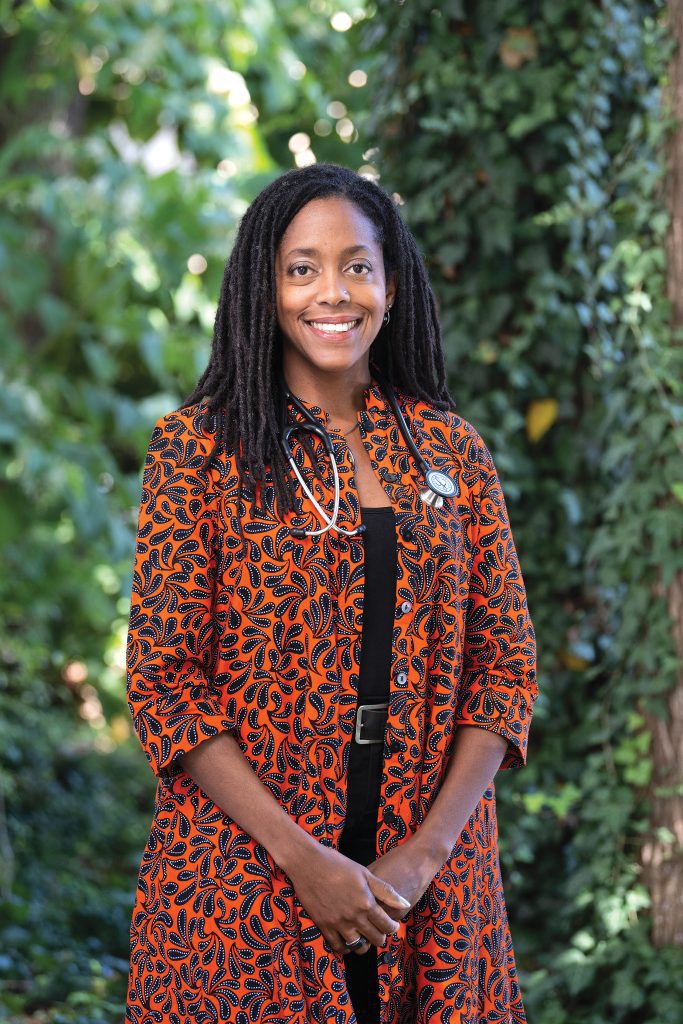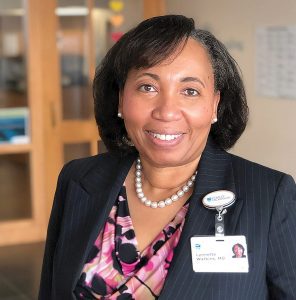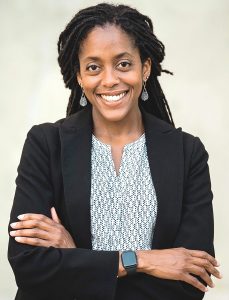Dr. Khama Ennis – BusinessWest

[ad_1]
Founder, Faces of Medicine and Intentional Health, LLC
She’s Determined to Boost Diversity in Healthcare — and Improve Outcomes

Dr. Khama Ennis loves the ER. She should, having been chief of Emergency Medicine at Cooley Dickinson Hospital for several years.
“I love the puzzle of it, and I love the immediacy of it,” she said. “The typical thing that comes to mind when people think about emergency medicine is adrenaline and chaos, but it’s never been that for me.”
Instead, “what I loved was the immediate connection, creating a safe space for somebody. You have to forge this immediate bond and ask really invasive, personal questions on what’s probably the worst day of their year, if not their life, and get them to share the things that are relevant so you get the information you need to get them the care they need. I really like that.”
But for most of her time there, Ennis was one of only two Black doctors in the hospital.
“There’s plenty of data that reflects the negative impact of inadequate diversity in teams,” she told BusinessWest. And in the latest chapter of her intriguing career, Ennis is doing something about that.
These days, she practices integrative medicine at a private office in Amherst called Intentional Health. But she also co-founded a nonprofit organization called Diversify Medicine in order to provide support for people from underrepresented backgrounds to gain access to careers in medicine.
She also founded Faces of Medicine, a narrative health-equity project centered on the journeys of Black female physicians — centered around a documentary series and a collection of mini-memoirs — with the goal of inspiring more women of color to enter the field of medicine and diversify the healthcare industry, with the idea that diversity in healthcare teams leads to a measurable and meaningful improvement in outcomes.
“Right now, black women are 2.8% of the physicians in the U.S., which is a little more than a third of what we represent in the population as a whole, so it’s clearly inadequate,” she said, noting that Black men, Latinx people, and Indigenous Americans face similar disparities. “Some groups are just underrepresented in these spaces, and outcomes suffer as a result.”
For her ongoing efforts, Ennis was honored this year by the Massachusetts Medical Society (MMS) with its Woman Physician Leadership Award, recognizing outstanding leadership and contributions to patients and the medical profession by a woman physician.
Ennis, the society noted, is viewed by her colleagues and the community as a leader in addressing structural racism in healthcare and social determinants of health. In addition to her work with Faces of Medicine, she penned several opinion pieces addressing race in medicine for the Washington Post and created a presentation for the Hampshire and Franklin County districts of the MMS that was selected by the Board of Registration in Medicine as one of three that meets the new licensure requirement for implicit bias education.
“I have continued to be impressed not just by how compassionate and professional a physician she is, but she’s also a tremendous role model for women physicians and for women of color,” said Dr. Kate Atkinson, a primary-care physician in Northampton and Amherst, when the award was presented. “Dr. Khama Ennis has been speaking out constructively and gently to educate and empower us all to do better.”
For that work, Ennis is not only a Woman of Impact, but someone whose impact on healthcare promises to bear fruit for decades to come.
Shifting Gears
Ennis was born in Jamaica; her family immigrated to the U.S. when she was a toddler, and she grew up in Southeastern Pennsylvania.
She graduated from Brown University with a focus in medical anthropology and earned her medical degree at NYU School of Medicine and her master of public health degree at Harvard T.H. Chan School of Public Health. She practiced at Cooley Dickinson Hospital for a decade and a half, starting in 2006, and eventually rose to chief of Emergency Medicine from 2015 to 2020 and medical staff president from 2022 to 2022.
But as early as 2018, she was looking for a change, for a number of reasons.
“Right now, black women are 2.8% of the physicians in the U.S., which is a little more than a third of what we represent in the population as a whole, so it’s clearly inadequate.”
“What I had come to do was done: the department was stabilized, the wait times were down, and we’d had some real achievements,” she recalled. She had also gotten divorced and found the 24/7 on-call nature of an ER schedule to be incompatible with effective co-parenting.
So Ennis switched gears and went into integrative medicine, opening Intentional Health in downtown Amherst earlier in 2023.
“My training is more allopathic, traditional, conventional Western medicine. But I provide and have received acupuncture, therapeutic massage is incredibly important, physical therapy is important, chiropractic is important. There are different ways to bring all of these different players in to optimize people’s health.”
Even elements like nutrition education is critical to her work. “I like being able to suggest … ‘if you eat that instead of that, you’ll still be full, but your blood sugar will come down.’ If people have a bit more understanding, they can have more control over their own health,” she explained.

Dr. Lynnette Watkins, president and CEO of Cooley Dickinson Health Care, is one of the four physicians profiled in the first episode of the Faces of Medicine documentary series.
“I’m not a primary-care doctor, and I think what’s terrible about our overall healthcare system is that it doesn’t allow primary-care doctors to get to a lot of this,” she added. “It’s structural; they’re given 15 minutes to see a person, and it’s really hard to get into depth in 15 minutes with anybody.”
So, in addition to her acupuncture certification, “I have studied lifestyle medicine, which looks at nutrition and activity, sleep, restorative practices, community, all those things that play huge roles in individual and community health.”
At the same time, Ennis has been hard at work over the past two years on Faces of Medicine, a memoir and documentary project that will have its first public screening on Monday, Oct. 16 at Amherst Cinema, with the first episode telling the stories of four Black women who are making an impact on healthcare locally: Dr. Lynnette Watkins, president and CEO of Cooley Dickinson Health Care; Dr. Thea James, associate Chief Medical Officer and executive director of the Health Equity Accelerator at Boston Medical Center; Dr. Valerie Stone, director of Health Equity Initiatives in the Department of Medicine at Brigham and Women’s Hospital; and Dr. Rose Cesar, a gastroenterologist at Baystate Franklin Medical Center.
“We’re also going to be telling the story of Rebecca Lee Crumpler, the first Black woman to ever earn an MD in the U.S.; that happened in 1864,” Ennis noted.
She plans on interviewing at least 30 physicians for the series, and has conducted 16 interviews so far.
“I reached out to different Black female physicians across the country. Some of them I knew; a lot of them were a friend of a friend or some other connection,” she explained. “But the first episode is all Massachusetts stories. They will be telling their own stories, pulled together from the interviews they’ve done over the last year and a half.”
Faces of Medicine will also arrange virtual screenings for two days after the Oct. 16 event for anyone who can’t make the premiere.
Crafting a documentary, for someone whose training is in a much different realm, was a challenge, she said, but a gratifying one. Her team includes Seth Lepore, who handles day-to-day operations; and Executive Producer Jenahye Johnson of Brooklyn-based Homebase Studios, a production studio and crew-sourcing agency that touts “storytelling through community.”
“I needed a company, so I incorporated a company. And then you need fiscal sponsorships, so I got fiscal sponsorships,” Ennis said. “And then I started fundraising at the very end of 2021. Thus far, we’ve raised about $250,000, which is what’s funded all of the work so far.

Dr. Khama Ennis was also honored this year with the Massachusetts Medical Society’s Woman Physician Leadership Award.
“Ideally, this can go in a couple different directions from here. I either continue grassroots fundraising to get the rest of the episodes funded and completed, or an executive producer with means says, ‘I love this project, and I want to help steward it across the finish line.’ That would be amazing. Or PBS or a streaming service says, ‘this is something that we’d really love to engage with.’”
The initial plan is to complete four episodes that span the breadth of the country, numerous specialties in medicine, and myriad stories and paths. The series could be a template for other underrepresented groups, too, from Latinx and Indigenous Americans to LGBTQ individuals, she said. “The whole goal is to have young people see themselves reflected in these stories and see possibilities they can grab onto.”
Worth the Effort
Faces of Medicine dovetails nicely with Ennis’s work on Diversify Medicine.
“The goal that I have there is to create a short-term database. There are lots of organizations doing great work to try to bring people into this space, but if you don’t know exactly what to search for, you’re not going to find a program that could support you.”
The database is intended to help underrepresented populations find resources to help them access medical careers, and she also plans to create a virtual mentorship network to amplify the voices of professionals of color already working in the space.
“We have concrete data that support the importance of diversity on teams for improving health outcomes,” Ennis noted. For example, one study came out that looked at the infant mortality rate in Florida, which was two to three times higher for black infants than for white infants — and that disparity was cut in half when the pediatrician was black.
“The data that I’ve found most specifically speaks to physicians, but I think it’s true of every player in the healthcare team. Doctors are useless without nurses, and nurses are useless without techs. We all need each other in order to do this work, so I truly believe that every level needs to reflect the population we’re serving.”
Meanwhile, Faces of Medicine holds the promise of inspiring young women of color to pursue the dream of a medical career from an early age.
“There are experiences in elementary, middle, and high school where people can either be encouraged or discouraged,” she said. “Somebody can express an interest in medicine, and somebody else can say, ‘oh, that’s really hard, are you sure?’ Or somebody can say, ‘that’s great; let’s figure out what the next step would be.’”
The women being profiled in Faces of Medicine all figured out that next step, and are able to clearly communicate how and why.
“Say you’re a smart kid, but you just don’t think it’s possible because you’ve experienced homelessness. We can show them somebody who had some real struggles in their family growing up, but they got here,” Ennis said. “I’m not Pollyanna; I don’t want to tell anybody that it’s easy. But I do want people to get that it’s worth it.”
[ad_2]
Source link
